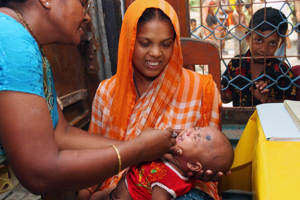Kat KelleyGHTC
Kat Kelly is a senior program assistant at GHTC who supports GHTC's communications and member engagement activities.

Gilead Sciences, a California-based biopharmaceutical company, has received US Food and Drug Administration (FDA) approval for Odefsey®, a complete, single-pill regimen for HIV and AIDS. Odefsey® contains tenofovir alafenamide (TAF), a modified version of the antiviral tenofovir, used to treat HIV and AIDS and hepatitis B. TAF is highly effective at entering HIV cells, and thus can be administered in doses a mere ten percent of that required for tenofovir-based medicines. Gilead also recently received a positive opinion from the European Medicines Agency (EMA) on Descovy, another TAF-based treatment. The EMA’s recommendation will be evaluated by the European Commission, which can grant regulatory approval for the 28 European Union member states.
Prior to the 2014 Ebola outbreak, the experimental therapy ZMapp had only been tested in non-human primates. The therapy, which is comprised of three antibodies against the virus, is particularly difficult to manufacture, and thus only seven patients received ZMapp during the outbreak. Now, results of the first human clinical trial of ZMapp affirms that the treatment could be an important tool in fighting Ebola. The randomized control trial was conducted by the US National Institute of Allergy and Infectious Diseases (NIAID) in partnership with the governments of Guinea, Liberia, and Sierra Leone. As the spread of Ebola slowed, so too did new cases, and thus the partners could only enroll 72 patients, one-third of the 200 for which they had planned. In the study, all patients received supportive care, including provision of fluids and electrolytes, and half of patients received three doses of ZMapp. Patients receiving ZMapp recovered much faster, in terms of symptoms and presence of the virus in the blood, and the fatality rate was lower for ZMapp recipients: 22 versus 37 percent. Despite the small trial size, NIAID Director Dr. Tony Fauci is optimistic that the FDA will “favorably consider” the results, in light of the dearth of approved Ebola treatments and positive animal study results, in which the drug was 100 percent effective.
A team of Google engineers is working with the United Nations Children’s Fund (UNICEF) to develop a platform to track and predict the spread of Zika, a mosquito-borne virus linked to birth defects that was recently declared a Public Health Emergency in Latin America. The platform uses data such as weather and travel patterns to anticipate communities at-risk for Zika, and will be adaptable for use in other outbreaks. Google is also providing a US$1 million grant to UNICEF for mosquito control and behavior change efforts, with the goal of reaching 200 million people throughout the Americas. The company is also working to ensure that helpful, accurate information is readily available to all using the search engine, adding detailed information in 16 languages on Zika prevention and symptoms as well as government public health alerts.